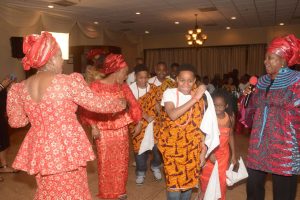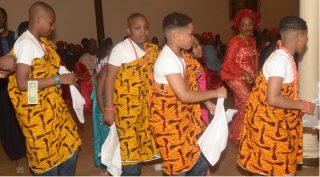Brief History Of Esan Culture & People
Esan (pronounced /aysan/) is one of the major ethnic groups in Edo State, Nigeria. The name ‘Esan’ owes its origin to Bini and was once corrupted to ‘Ishan’ by colonial Britain. Esan land is bordered to the south by Benin, to the south-east by Agbor, to the north and east by Etsako, to the west by River Niger. From Ewu to Benin City, the State capital, is 100kms long. The people populate areas such as Uromi, Ewatto, Igueben, Irrua, Ubiaja, Ebele, Ehor, Ekpoma, Ewu, etc in central Edo State, South-South Nigeria. It has flat landscape, one lacking in rocks and mountains, and good for agricultural purpose. Palm tree and rubber tree (used for the production of plastic products) rank highest among Esan trees. The land’s variety of fruits range from mango, orange, grape, pineapple, guava, cashew, banana, plantain, black pear, avocado pear, lime to walnut and even more. Cassava, yam, cocoa yam, sweet potato, pepper, okra and rice are some of its farm produce. It has numerous streams that are too small to afford fishing. Esan people are proud of their ancestry and heritage.
 |
 |
 |
|---|
The people are said to be positive in outlook, creative, industrious and highly educated. History has it that they hailed from ancient Bini, and their language is of Kwa subdivision of the Niger-Congo language family. Replete with different dialects, Esan language is quite unintelligible to even many native speakers. For instance, the Esan word for person (or, somebody) is variously called by the different kingdoms’ dialects as ọria (by Uromi, etc), ọhia (by Uzea, etc), ọyia (by Unea, etc), ọhan (by Ugbọha, etc). This obvious difficulty associated with speaking others’ dialect other than one’s mother dialect has given rise to the widespread use of Pidgin English, which is the local patois, a mishmash of Portuguese, English and Nigeria’s local languages.
During the era of the military, the Esan had between five to six high ranking military, police and Naval officers as governors of various states around the country at different occasions, a feat that owed much to their learning and sociability. Chief Ikimi and Chief Anenih— have been known to occupy the position of chairman of two national parties —NRC and SDP respectively.
Esan Day is celebrated at the Tafawa Balewa square, Lagos every December; there, names of all prominent Esan people are read to loud ovation. Esans believe in self help, thus assisting to reach villages and towns to achieve development. Prominent Esan are Chief Anthony Enahoro, who raised the motion for the independence of Nigeria; Peter Enahoro, who wrote How to be a Nigerian, Tony Anenih, a top Nigerian politician and former minister of Works and Housing. Other names include the late Ambrose Alli, Governor of Bendel State; Bishop Ekpu, Anthony Cardinal Okogie; late first lady Stella Obasanjo (late); musician Sonny Okosun and writer Aba Aburime I. Also included are Chief Tom Ikimi, former foreign minister (during the period of Gen. Sani Abacha); former Lagos state police commissioner, Oyakhilomen; former vice president of Nigeria, Augustus Aikhonmu (retired Real Admiral); former deputy commissioner of Lagos state Vincent Airebamen.
Esan are fun-loving people who have various festivities and ritualistic traditions.Their folktales and folklores serve as forms of learning and entertainment, like the famous Igbabonelimin. They have prominent traditional rulers who keep order and sanity in a complex society where beauty and manners are intertwined. Despite the long-term impact of Christianity among Esan, the people are fetish in that a large number still practice traditional beliefs in the form of worship of ancestral spirits and other gods. A large percentage of Esan are Christians, mostly Catholic and recently of other denominations. Esan has various dialects all of which stem from Bini and there is still close affinity between the Esan and the Bini, which leads to the common saying ‘Esan ii gbi Ẹdo’ meaning, Esan does not harm the Ẹdo (i.e. Bini).
Esan are great poets, writers, singers, carvers, farmers, scholars, storytellers, etc. The folklore and history of the Esan tribe is worth re-visiting and attempt should be made to research the various ways that the villages are related to the Ẹdos, and others who may have occupied Ifeku Island many years ago. The Esan heritage is unique despite the variation of dialects.
A handful of Esan families are known to possess Portuguese ancestry, resulting from links dating back to the 16th Century when Portuguese sailors and tradesman first entered the Bini Kingdom via the coast. British arrived Bini in the wake of the Portuguese numerous expeditions to, and intercourse with, Bini.